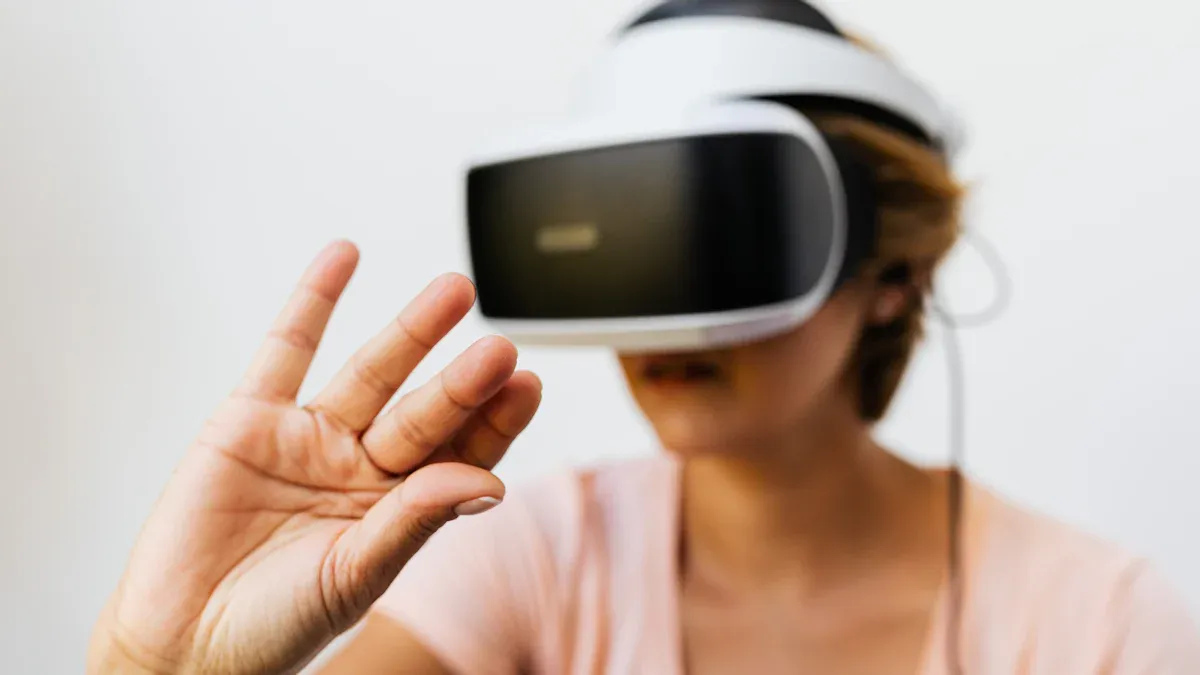
Smart rings have transformed how we monitor our health. These tiny yet smart devices utilize advanced technology and sensors to track various aspects of your body. A smart ring can check things like your smart ring temperature, heart rate, and sleep patterns. It provides real-time updates to help you understand your body better. The temperature sensor in the ring simplifies the process of tracking heat changes. This device is an effortless way to incorporate health tracking into your daily routine.
Key Takeaways
-
Smart rings check your body temperature, heart rate, and sleep often.
-
They use special sensors to track health details correctly.
-
This helps you notice early signs of getting sick.
-
Smart rings are small and comfy, so you can wear them all day.
-
You can use their data to set goals and live healthier.
-
As they improve, smart rings are great for managing your health.
The Technology Behind Smart Rings
Sensors in Smart Rings
Smart rings use different sensors to check your health. These include bioimpedance, PPG, and temperature sensors. Each sensor has a special job in tracking your body. For example, bioimpedance sensors measure blood pressure accurately. They are great for heart health and work on all skin tones. PPG sensors track blood flow changes. This helps monitor heart rate and oxygen levels. Together with smart algorithms, these sensors make health tracking easy.
Smart Ring Temperature Monitoring
Temperature sensors in smart rings check your body heat all day. Unlike regular thermometers, they work without any effort from you. They give real-time updates about your body temperature. Special algorithms make these sensors accurate, even in tough conditions. You can see the data on your phone anytime. Watching your temperature closely can help spot early health problems.
|
Feature |
الوصف |
|---|---|
|
Continuous Monitoring |
Tracks body temperature all day, unlike normal thermometers. |
|
Higher Accuracy |
Smart sensors and algorithms give correct readings in any condition. |
|
User Convenience |
Simple to use; data is easy to check on your phone. |
Data Processing and Algorithms
Smart rings collect raw data and process it with algorithms. These algorithms study the data to give correct health info. They also find unusual patterns for better results. Clean data helps reduce errors and improves accuracy. The algorithms can be updated to stay useful over time. By using research data, they make health tracking more reliable.
Health Metrics Monitored by Smart Rings
Body Temperature Tracking
Smart rings make it easy to check your body temperature. They use special sensors to measure skin temperature all the time. Unlike regular thermometers, they track changes over days. This helps you notice if your temperature rises, which could mean you're sick.
A study shared with the FDA showed smart rings, like the Oura Ring, can find ovulation by tracking temperature. This shows how well they follow unique temperature patterns. By focusing on nighttime readings, they avoid errors from daily activities or weather. Keeping track of skin temperature also helps scientists learn more about health.
Heart Rate and Variability
Smart rings also check your heart rate and its changes. They use PPG sensors to watch blood flow and give real-time updates. Heart rate variability (HRV) shows how stressed or relaxed your body is.
Studies prove smart rings work well for tracking HRV and resting heart rate (RHR). For example, the Oura Ring 4 was very accurate in a two-week test. Watching your heart rate and HRV helps you understand stress and heart health better.
Sleep and Activity Monitoring
Smart rings are great for tracking sleep. They study your sleep stages, like light, deep, and REM sleep. They are 96% accurate for total sleep time and 79% accurate for deep and REM sleep. This data helps you improve your sleep habits.
They also track your daily activity, like steps and calories burned. This makes them helpful for staying active. Studies show smart rings, like the Oura Ring, match well with top sleep tests like polysomnography. By tracking both sleep and activity, smart rings give a full picture of your health.
Blood Oxygen and Glucose Levels
Smart rings have changed how we check الأكسجين في الدم and glucose levels. They use advanced sensors like PPG to measure blood oxygen saturation (SpO2). SpO2 shows how well oxygen moves through your blood. Watching SpO2 can help find early signs of breathing problems or other health issues.
Some smart rings also monitor blood glucose levels. Non-invasive sensors check glucose without needing to pierce the skin. For example, the Vertu AI Diamond Ring uses a special PPG sensor to give glucose data. This makes it easier to learn about your health without pain from traditional methods.
💡 Did You Know?
A study in Nature Medicine showed wearable devices, like smart rings, can match regular health tests. Over three years, researchers found these devices could track changes in الأكسجين في الدم and glucose levels. They even spotted health problems like dehydration or sickness using wearable data.
Still, be careful with glucose tracking. The FDA hasn’t approved non-invasive devices for checking blood glucose yet. Wrong readings could cause serious health problems. Always talk to a doctor for important health choices.
Smart rings make tracking these health metrics simple. You can see live updates on your phone, helping you stay on top of your health. With advanced technology and easy designs, these rings help you take charge of your well-being.
Benefits of Smart Rings for Health Tracking
Convenience and Comfort
Smart rings are small and very easy to use. They are not bulky like other wearables, so you can wear them all day. Unlike gadgets with screens, their batteries last longer, often for days. This means fewer charges and less hassle for you.
These rings are light and comfy, even while sleeping. You can track your health without feeling uncomfortable. Their simple look lets you stay connected without big devices. This makes them a stylish and useful part of your daily life.
Real-Time Health Insights
Smart rings give quick updates about your health. They use special sensors to check things like heart rate and skin temperature. This helps you understand how your body reacts to stress, rest, and activity.
For example, they track SpO2 levels day and night, showing changes in oxygen levels. They also measure HRV, which shows how your body handles stress. With this info, you can spot patterns and make better health choices.
💡 Tip: Use your smart ring’s data to set small health goals and track your progress.
Early Detection of Health Issues
Smart rings help find health problems early by watching your body closely. They check things like skin temperature and breathing rate for small changes. For example, they can spot early signs of sickness, like COVID-19, by tracking temperature and heart rate.
They also help track stress and mood changes using skin signals. This helps you deal with problems before they get worse. While they don’t replace doctors, they give helpful data to support your health.
With these features, smart rings make it easier to take care of your health every day.
Long-Term Health Monitoring
Smart rings are changing how we track health over time. These rings keep checking your body and give useful information daily. Wearing one every day shows patterns in heart rate, sleep, and temperature. This steady tracking helps you see how your habits affect your health.
A big benefit of smart rings is spotting small health changes. For example, a higher resting heart rate or poor sleep might mean stress. Finding these signs early lets you fix problems before they get worse.
Tracking health long-term helps you make better choices. You can see how diet, exercise, or sleep changes affect you. For instance, if less screen time improves sleep, you can keep that habit.
Scientists are still studying how well smart rings work over time. They want to know if people use them and find them helpful. Results may differ, but smart rings could change health tracking forever.
Using a smart ring daily gives you a strong health tool. Its constant updates make it a key part of modern health care.
Comparing Smart Rings to Other Devices
Smart Rings vs. Smartwatches
Smart rings and smartwatches both track fitness, but they differ. Smart rings are small and easy to wear all day. They focus on health metrics like heart rate, sleep, and temperature. Smartwatches have more features, like apps and notifications, but can feel bulky.
Here’s a quick look at their tracking accuracy:
|
Device |
Heart Rate Accuracy |
Caloric Error |
Sleep Accuracy |
Step Error |
|---|---|---|---|---|
|
Oura Ring |
13% |
94% |
50.3% |
|
|
WHOOP |
99.7% |
N/A |
90% |
N/A |
|
Garmin |
1.16-1.39% |
6.1-42.9% |
98% |
23.7% |
|
Fitbit |
N/A |
N/A |
N/A |
N/A |
This table shows smart rings, like the Oura Ring, are great for heart rate and sleep tracking. They are a good choice for focused health tracking.
Smart Rings vs. Thermometers
Thermometers and smart rings both measure temperature but work differently. Thermometers give one-time readings, which can be affected by room temperature. Smart rings track your temperature all day and night.
Studies show smart rings, like the Oura Ring, can find early illness signs. For example, in healthcare workers, the Oura Ring noticed a 0.63°C temperature rise in people with fevers. This constant tracking helps find health problems earlier than thermometers.
Smart Rings vs. Fitness Trackers
Fitness trackers and smart rings share features but suit different needs. Fitness trackers have screens and detailed activity tracking, great for workouts. But their size may not be comfy for all-day wear.
Smart rings are smaller and track key metrics like heart rate and sleep. They are light and comfy, even while sleeping. If you want a simple, stylish way to track health, a smart ring is a great option.
💡 Tip: Choose a smart ring for a comfy and discreet way to track health.
Accuracy, Privacy, and Security in Smart Rings
Accuracy of Smart Rings
Smart rings are very accurate for health tracking. They use advanced sensors and smart algorithms to check your body. These rings track heart rate, blood oxygen, and HRV well. For example:
-
Heart rate is correct within ±2 BPM when resting.
-
During exercise, heart rate is accurate within ±3 BPM.
-
Blood oxygen levels are measured with ±2% accuracy from 70%-99%.
A study compared two types of algorithms in smart rings. The results were:
|
Metric |
Generalized Algorithm |
Personalized Algorithm |
|---|---|---|
|
Sensitivity |
94% |
93% |
|
Specificity |
70% |
83% |
This shows smart rings give reliable health data. They are great tools for daily health checks.
Privacy Concerns in Health Tracking
Smart rings are helpful but can cause privacy worries. They collect private health data like heart rate and activity. Studies found some risks:
-
Wearables might leak data or allow hacking.
-
About 48% of Britons fear wearables may share personal details.
-
Companies often lack strict rules for handling health data safely.
Apps linked to smart rings store lots of data. If not protected, this data could be misused. Always check privacy policies to keep your data safe.
Security Features in Smart Rings
Smart rings have strong security to protect your data. Many rings use biometric logins to stop identity theft. Some can send emergency alerts for extra safety.
These rings also work with smart home systems while staying secure. They mix safety with useful features, so you can use them without worry.
Future of Smart Ring Technology

Advancements in Smart Ring Sensors
Smart rings are improving quickly with better sensor technology. These updates make health tracking more accurate and dependable. For instance, new sensors can check blood oxygen, stress, and early illness signs. Longer battery life means you can use the ring for a week without charging.
|
Trend |
الوصف |
|---|---|
|
Better health tracking and predictions using smart technology. |
|
|
Improved Battery Life |
Rings lasting up to seven days on one charge. |
|
Next-Gen Health Tracking |
Sensors that measure oxygen, stress, and early sickness. |
|
AI-Powered Insights |
Advanced algorithms offering personal health advice. |
People’s interest in health and fitness drives these changes. Smarter sensors and tools give clear health details, making smart rings a must-have for health-focused users.
Integration with Health Platforms
Smart rings now work well with digital health systems. They connect easily to health apps, giving a full picture of your health. For example, they are better at tracking sleep than wrist devices. This makes health tracking more effective.
-
Smart rings can control other devices with simple gestures.
-
AI tools give personal tips, like energy scores, shared with health apps.
These features make smart rings more than just gadgets. They link you to a bigger health system, helping you make smarter lifestyle choices.
Medical Applications of Smart Rings
Smart rings have huge potential in medicine. Research shows they can find early illness signs, like COVID-19, by checking temperature changes. For example, the Oura Ring noticed temperature rises 2.75 days before symptoms started.
|
Study Focus |
Findings |
Source |
|---|---|---|
|
Early detection of COVID-19 |
The Oura Ring found symptoms 2.75 days before testing. |
|
|
Detection of fever |
The Oura Ring spotted fevers before symptoms appeared. |
|
|
Public health management |
Smart rings can help track and manage diseases. |
These studies show how smart rings can help public health. They offer easy, constant monitoring, making them useful in medical care.
Smart rings are changing how people keep track of their health. These rings check important body signs all the time. This helps you make better health choices early. Many users say their sleep got 20% better in weeks. They also like getting quick updates to make smart decisions. Smart rings can warn you about health problems early. This is helpful for managing conditions like diabetes or high blood pressure.
As technology improves, smart rings will work even better. They fit easily into daily life, making them a key tool for staying healthy.
التعليمات
How are smart rings different from other wearables?
Smart rings are smaller and less noticeable than smartwatches. They track health metrics like heart rate, sleep, and temperature. Their light design makes them comfy for all-day use, even at night.
Can smart rings find early signs of sickness?
Yes, smart rings watch body temperature, heart rate, and oxygen levels. These can show early signs of sickness, like fever or stress.
💡 Tip: Wear your smart ring daily to notice small health changes early.
Are smart rings safe to use in water?
Most smart rings, like the Vertu AI Diamond Ring, are waterproof. You can wear them while washing hands or swimming in shallow water. Always check the product details to be sure.
How do smart rings keep your health data safe?
Smart rings use encryption and biometric locks to protect your data. They also limit who can see your personal health info. Check the app’s privacy policy for extra safety.
Do smart rings need charging often?
No, smart rings usually have long-lasting batteries. For example, the Vertu AI Diamond Ring works for up to 10 days per charge. This makes them easy to use for health tracking.
🔋 Note: Follow charging tips to keep your smart ring working well.




